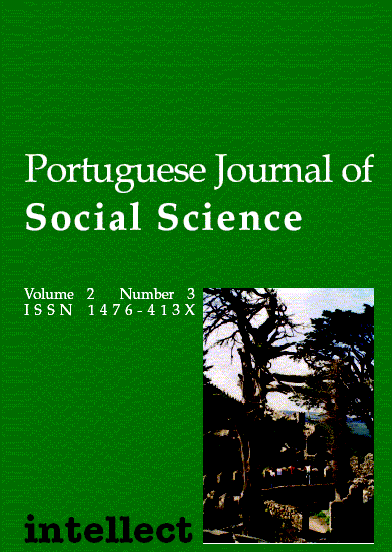ISSN 1476-413X

Political integration of 'lusophone' non-national citizens in portugal:perceptions of key political actors
(pp. 133-148)
Isabel Carvalhais
Images of the public in the debates about risk: consequences for participation (pp. 149-163)
Maria Luísa Pedroso de Lima
Democratic breakdown and transitions to democracy in Portugal
(pp. 165-192)
Jarle Hersvik and Stein Ugelvik Larsen
Book review:
Portugal y España en los sistemas internacionales
contemporáneos
António José Telo e Hipólito de la Torre Gómez
Reviewed by R.A.H. Robinson
Political integration of 'lusophone' non-national citizens in portugal:perceptions of key political actors
[Abstract]
Based upon research conducted between 2001 and 2003, this text explores the perceptions of key political actors in regard to the political integration of non-national citizens in Portugal, wondering about their sensitivity to the idea of stimulating a post-national attitude in this society. It concludes that political actors tend to recognize the existence of an incipient participatory dynamic between democracy and non-national residents. However, positions diverge about the relevance that such incipience must be given in the evaluation of Portuguese democracy’s health, denouncing the existence of a tension between a conservative line of thought that perceives citizenship within the traditional nation-state’s paradigm, and a progressive line that perceives it beyond the constraints of national membership. There persists also a counterproductive bluriness about the citizen as a non-national and the citizen as a member of an ethnic community – a problem particularly evident in the analysis of the ‘lusophone’ case.
Images of the public in the debates about risk: consequences for participation
[Abstract]
This paper focuses on the difficulties of risk management, specially when the results from risk perception (the views of the risk by the general public) do not overlap the results of risk assessment (the results of technical expert analysis). Two strategies are identified to overcome these differences: information and partnership, the former being clearly promoted by the EU values. However, the implementation of this strategy depends on a image of the public as a partner in these complex societal negotiations. Three images of the public are identified as particularly negative to this debate: the image of a emotional public, the idea of a selfish public and the idea of a biased public. In different ways all of them convey the idea that the members of the general public should not be taken seriously, undermining the success of a participatory decision process.
Democratic breakdown and transitions to democracy in Portugal
[Abstract]
This article has very modest aspirations: We will utilize elementary game theory in two versions in order to illuminate how this type of thinking may make more explicit the analysis of two of Portugal’s most important political events in modern times: the breakdown of democracy in 1926 and the transition to democracy in 1974. The first process we will also link to one type of framework – ‘funnel of causality’ - as a means of organizing the theoretical understanding of the process. As the reader will understand, we thus pay special attention to pedagogical instruction and analytical clarity, rather than an extensive empirical test and methodological sophistication. In order to give the analysis a comparative relevance, we shall use concepts of modern breakdown- and transition theory when commenting on the decisions made by the main actors.